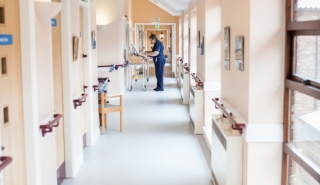Diabetic retinopathy is caused when diabetes affects the small blood vessels in the retina. The vessels can leak and become blocked. The retina is the “seeing” part of the eye and, if left untreated, diabetic retinopathy can cause blindness. It does not usually affect your sight until it is quite advanced and more difficult to treat.
Frequently asked questions
If you have a question that hasn't been answered below, please get in touch with our team.
What is diabetic retinopathy?
What can I do to help reduce the risk of getting it?
You can reduce the risk of your retinopathy getting worse if:
- you try to cut down or stop smoking if you are a smoker
- you continue to attend your diabetic eye screening appointments every year
- your blood sugar (HbA1c) is kept at the levels agreed with your health care team
- you see your health care team regularly to check your blood pressure is not raised
- your blood fats (cholesterol) are kept at the levels agreed with your health care team
- you get professional advice if you notice any new problems with your sight
- you eat a healthy, balanced diet
- you try to lose excess weight if you are overweight
- you take your medication as prescribed
- you exercise regularly
Who do you screen for diabetic retinopathy?
All people with diabetes aged 12 and over should have their eyes screened. National guidelines state that this also includes people who have had bariatric surgery or who no longer show the symptoms of diabetes.
How do I get my appointment?
Your appointment letter or an invitation to make an appointment online will be sent out to you in the post.
I've received my appointment letter but I can't make that date or time - what should I do?
If the appointment is not convenient, it is important that you tell us so that we can change it to a more suitable time and place. Please get in touch via our contact us page. We have an answer machine to take messages for calls outside office hours.
I will not be able to attend for a few months due to holidays/sickness/working away - what are my options?
If you are only going to be away for a few weeks, we can book your appointment for when you get back.
If you are away for a longer period, then we can postpone your appointment up to six months. It is recommended that you attend screening every year.
Please contact us to discuss your requirements.
How long will my screening appointment take?
We suggest that you allow 30-40 minutes for your screening appointment.
What happens at the screening appointment?
The screener will test your vision and put drops in your eyes to dilate your pupils.
We use a special type of camera to take digital photographs of the retina at the back of your eyes.
You can find more details on the your appointment page.
Does it hurt?
Sometimes the dilating drops will sting for a few seconds and you will be encouraged to blink to help with this.
Otherwise, nothing takes place during the screening that will hurt.
Can I drive after my screening appointment?
Your sight may be blurry for a few hours and you shouldn't drive until it returns to normal. We'd recommend organising another mode of transport to your appointment.
Do I need to bring anything with me?
Please bring your appointment letter and any glasses that you wear for distance vision (you don't need to bring your reading glasses).
We also recommend brining sunglasses as your eyes may feel sensitive after the eye drops.
I have limited ability - can I still be screened?
We are trained to care for people of different abilities and will support you through the appointment.
We will work at your pace and make sure that you are comfortable.
I speak a different language to English. Are there interpreter services available?
Interpretation services are available.
Please contact us before your appointment to arrange this.
Is there adequate wheelchair access at the screening venues?
All our screening venues are accessible to all people. Please let us know if you are eligible for hospital transport and we will book you a suitable screening venue. You will need to book the transport yourself. There is more information on the patient transport service website.
Will I get a copy of my results?
We will send you and your GP your results in the post within three weeks of your appointment.
I don't understand my results. Who should I call?
Visit the understanding your results page for more information.
You can also contact us to speak to a member of the team about your results.
I have been told I have pre-proliferative retinopathy or maculopathy. What happens next?
You will be asked to have a further screening test with us within three months if you have signs of pre-proliferative retinopathy or diabetic maculopathy that has progressed but does not yet require treatment.
You can find out more about each of these on the your results page.
We will refer you to see an eye specialist at your local hospital if we think you might need treatment.
What treatment is available?
Laser treatment is used to treat proliferative diabetic retinopathy and maculopathy.
Some people with maculopathy may be offered VEG F inhibitors, which is a drug that is injected into the eye. This helps to reduce fluid in the macula (the central seeing part of the eye) and is an effective treatment in reducing the risk of sight loss.
Your eye specialist will explain the treatment to you at the time of the appointment. It is important that you attend the appointment to make sure that you are fully aware of the risks when choosing to have or not have any treatment.






